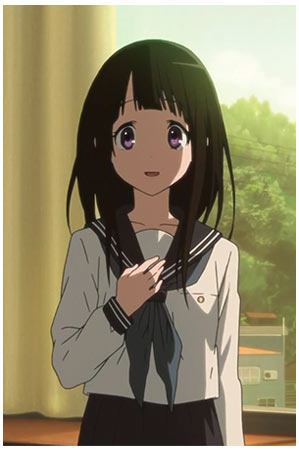One interesting aspect of the Japanese language is its “vertical” nature, with different words used in different situations depend on whether you’re addressing a superior like your teacher or a senpai, a friend from your class or someone younger than you. Japanese has a lot of flexibility with pronouns, with words like watashi (a neutral word for “I” usually used by females), boku (polite “I” usually used by boys), ore (oh-reh, a masculine-sounding first-person pronoun used by alpha males), and so on. One of the more interesting of these is omae (oh-MY-eh), a somewhat rough word for “you” that males will use around each other or with females who are the same age or younger than them, though it can come off as rude at times. In Hyouka, the beautiful new mystery anime series from Kyoto Animation, there’s a scene where the main character Oreki meets Eru Chitanda for the first time, and says, “Now that you mention it, how did [omae], excuse me, Chitanda-san enter this locked room?” While Eru doesn’t seem to mind having the pronoun used in reference to her, certain Japanese females would feel the boy is talking down to her and object. Of course, some girls like the word for this reason, and get all tingly at the thought of having the boy they like refer to with the word omae.

Japanese is a “vertical” language with many layers.















